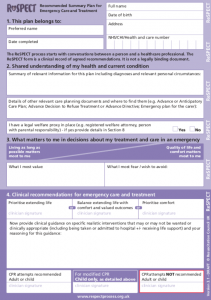Talking about death, dying and grief
Talking about death, dying and grief
Talking about death, dying and grief may be hard and emotional, bringing tears, laughter, anger, frustration or relief. Our caring and experienced palliative care team offers this advice for having a conversation about this very important topic.
Why talk about death and dying?
 There are lots of reasons why you may want to talk about death and dying. It can help you feel that you are getting organised. It can let a person express their thoughts, feelings and wishes to the people closest to them. And it can help you to make the most of the time you have together.
There are lots of reasons why you may want to talk about death and dying. It can help you feel that you are getting organised. It can let a person express their thoughts, feelings and wishes to the people closest to them. And it can help you to make the most of the time you have together.
Talking about death and dying won’t make it happen more quickly. But it can give a feeling of relief that nothing has been left unsaid and that loved ones can feel that they are able to cope better with the practical and emotional impact of death.
Death and dying is not a topic that only dying people want to talk about and anyone at any stage in life can make plans for the end of their life.
How to talk about death and dying
There is no specific way that works for everyone and there is no special training that you need to have these conversations.
Just being there, listening, responding to the needs of the person you are talking to, not having all the answers but letting them say whatever it is they want to is a good start.
Things you might discuss
 Some examples of things that you may want to talk about include the person’s wishes about:
Some examples of things that you may want to talk about include the person’s wishes about:
- where they want to be cared for at the end of life
- where they would want to die
- arrangements for any dependents
- a funeral or any specific requests
- whether they want to make a Will,
- whether they would want to donate their organs.
- decisions such as what treatments they would or would not like to receive
- how they would like to be remembered, and anything important that they would like people to know before they die.
This is a lot to discuss. To some people some of these things may be really important, and to others, less so. Don’t feel that everything needs to be discussed in one conversation. Take it slowly and respond to what they want to talk about.
Talking about death and dying can be emotional and it can be hard. There are some things that can make it easier.
How to make talking about death and dying a little easier
Talking about death and dying can be emotional and it can be hard. There are some things that can make it easier:
- Choose a moment when you have time, space and the ability to give the person your full attention. Trying to have important conversations when you are in a rush or distracted will never make it easier.
- Use open questions such as ‘Do you think we should talk about the future?’ to give the person the option to talk, but also the future can be interpreted in different ways and the person can discuss a range of things if they want to.
- Be reassuring – say things like ‘this isn’t an easy conversation but it feels important for us to talk about your wishes if you want to’. Remember that every person is different so often it is not reassuring to say that you know how they feel because you have had a similar experience previously. Just let them describe what it is that they are feeling.
- Be open and honest about how you feel, as this can help others feel they have permission to share their true feelings as well. There may be laughter, there may be tears or anger, frustration or relief. Any response is ok and just being there and listening without filling all the silences can give space to bring up what actually matters to them.
- Don’t worry that you’ll say the wrong thing or that something you say will upset the person. This can lead to people avoiding the conversation altogether. It’s important to remember that we often regret the things we haven’t said rather than the things we have said. And it is ok to be honest and say – ‘I’m worried about saying the wrong thing or hurting your feelings, but I don’t want you not to have the opportunity to talk about what matters to you’.
Different people, different approaches
 The same approach might not be best for everyone. Some people may prefer to write their thoughts down, some may record it or some might want to speak face to face. Some people may not want to speak about it at all and for some it might be not right now but at some point in the future. As long as they have the opportunity to express their wishes, thoughts and feelings in whatever way feels right to them, then that is all that we can aim for.
The same approach might not be best for everyone. Some people may prefer to write their thoughts down, some may record it or some might want to speak face to face. Some people may not want to speak about it at all and for some it might be not right now but at some point in the future. As long as they have the opportunity to express their wishes, thoughts and feelings in whatever way feels right to them, then that is all that we can aim for.
No conversation is perfect but being open to talking about death and dying gives the opportunity for honesty which can help everyone feel more supported.
When to talk about death and dying
 People may want to have conversations about their wishes for the future more than once.
People may want to have conversations about their wishes for the future more than once.
Around the time of diagnosis is often a very emotional time which can bring up lots of questions and thoughts. Sometimes when a treatment plan changes, or a person’s circumstances change or their physical ability changes, there is an opportunity to revisit the conversation.
For instance, if a person wishes to be cared for at home, but can no longer manage the stairs. They may need equipment to support them to live on one level. Wishes can change and this is also absolutely fine.
Expressing wishes in the ReSPECT document
In Bradford we use a document called the ReSPECT document which allows people to discuss their care and treatment wishes with a health professional and document them. This is a document that can be revisited and changed as often as is needed. Speaking to your health care team about this can give guidance and support.
Speaking with someone who has dementia
In certain circumstances such as with a diagnosis of dementia, it can be important to have conversations about future wishes earlier on in their illness in order to give them the opportunity to think about and get across as many of their wishes as possible and for these wishes to be honoured by their loved ones when they can no longer express themselves fully.
Again everyone is different and just because a person has a diagnosis of dementia, it doesn’t mean that they cannot make decisions right up until the end of their life, and it is crucial to encourage independence as much as we can. Again, documenting wishes can be very useful to ensure that everyone is on the same page.
Talking to children
 Talking about death and dying with children can be very hard. Speaking to children and showing them that we can talk about death and dying helps them to feel more supported and less frightened, confused, alone and guilty.
Talking about death and dying with children can be very hard. Speaking to children and showing them that we can talk about death and dying helps them to feel more supported and less frightened, confused, alone and guilty.
Every child is different and what is right for one will not be right for another. Be led by the child. You may be surprised by some of the questions they ask. Don’t worry if you don’t know the answers. It is ok to be honest and say that you don’t know.
Remember that children can take things very literally and so being clear and direct with what you are saying and avoiding vague phrases is good. Children can also be very ‘in the moment’ and may talk deeply about death and dying for a few moments and then move onto something completely different. This is completely normal.
Helpful resources
Hospice UK has helpful information on talking about death and dying and talking to someone with dementia.
The Alzeimer’s society has information about how to support a person with dementia during bereavement and talking about death and end of life with a person who has dementia from people who have been through that experience.
Winston’s Wish is a charity that helps children, teenagers and young adults (up to the age of 25) find their feet when their worlds are turned upside down by grief.
MyWishes is a free to use, ‘tech for good’ platform which enables you to write your Will, safeguard your digital legacy, plan your funeral, curate a bucket list, leave goodbye messages and make plans for your future health and social care within an Advance Care Plan.